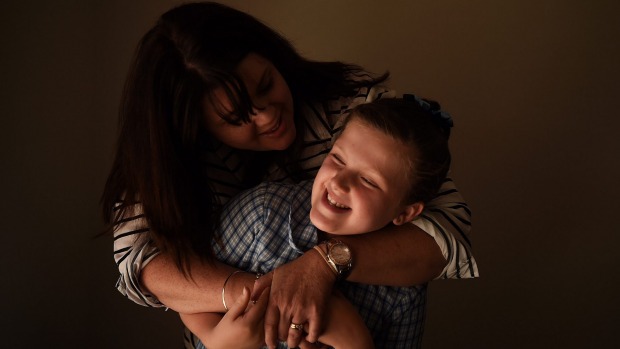
For five-year-old Elizabeth Doughty, it all started with a seemingly persistent sniffle.
In August 2012, Elizabeth went with her mum Natasha to her doctor with what appeared to be a recurring sinus infection.
But shortly after, she developed double vision, prompting a diagnosis no parent wants to hear.

“Within one week, our whole lives changed,” Mrs Doughty said.
“It was only because I had a gut feeling something wasn’t right that I took her down to the Children’s Hospital at Westmead,” she said.
“From there it all changed very quickly.”

Scans showed a “very aggressive” tumour the size of a lime was growing just below her eye, touching her brain.
As surgery was impossible, Elizabeth immediately began a full year of gruelling weekly chemotherapy, and a further month of radiotherapy to kill and shrink the cancer.
The cancer left Elizabeth blind in her right eye, but the therapy was otherwise successful: Elizabeth has been tumour-free for two years, and is a “happy, healthy, active” eight-year-old.
“We’ve moved on, but I don’t know that [the experience] ever leaves you. You still have good days and bad days,” Mrs Doughty said.
While Thursday marks World Cancer Day, Australian scientists will announce a massive research project predicted to be a “game-changer” for the treatment and diagnosis of cancer patients like Elizabeth.
Known as ProCan, the project will analyse the proteins in “all types of cancers” to create a globally available database akin to the Human Genome Project.
The research, led by the Children’s Medical Research Institute at Westmead, will analyse 70,000 cancer samples over the next seven years, starting with childhood leukaemia.
Using new technologies known as mass spectrometers, researchers will quantify the different proteins in the tiny samples, each smaller than a milligram, and map the results against drugs that proved effective and ineffective for each case.
The study will further the field of “proteomics”, or the study of proteins – the structural and functional base of all living cells. In cancer cells, faulty proteins are produced by mutations in the cell’s DNA, allowing the cell to divide and multiply uncontrollably.
Many existing cancer drugs can target and break down specific proteins, but the new research will make it possible to predict with “increased accuracy” the best drug combination for any individual patient, says Professor Roger Reddel, co-leader of ProCan and director of the Children’s Medical Research Institute.
“Currently, when an oncologist is making a treatment decision, they go on … the probability that a particular combination of drugs will work for the particular type of tumour. It’s a fairly imperfect prediction,” Professor Reddel said.
“What we are hoping to do – by studying very large numbers of patients and correlating the protein patterns with the drugs that the patients did and didn’t respond to – is use the drugs we’ve got now in a much more effective way,” he said.
This could mean existing drugs may prove useful for treating different cancers with similar proteins, and allow for the discovery of new treatments altogether, according to ProCan’s co-leader, biochemist Professor Phil Robinson.
Professor Robinson said the study would lower the need for patients to waste time trialling medications which will not effectively treat their cancer.
“What we’re trying to do is allow a doctor sitting across from a newly diagnosed cancer patient to choose the best treatment for that person,” Professor Robinson said. “It’s individualising or personalising the treatment choice.”
While proteomics studies have been done before, the ambitious “industrialised” scale of the ProCan study is a world-first, according to the Children’s Medical Research Institute.
The information will be released in a globally available database, in an attempt to spark international collaboration at the same scale as the Human Genome Project of the 1990s.
“We hope this will spark many other proteomics centres. We are not afraid of competition, we kind of welcome it,” Professor Robinson said.
“We hope it’s the beginning of that kind of revolution in the long run, but that remains to be seen.”
The Children’s Medical Research Institute was granted $10 million by the Australian Cancer Research Foundation to begin the project.
ProCan will officially begin in September..
